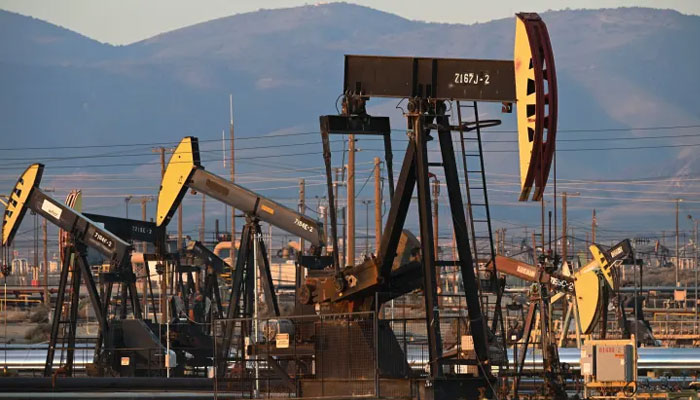Oil prices hit 4-month low on concerns about US, Chinese economy
NEW YORK: Oil prices fell more than $3 a barrel on Thursday, extending losses from the previous session, as investors in New York responded to signals of higher supply in the United States and expectations of weak energy demand in China.
Brent futures fell $2.60, or 3.2 percent, to $78.58 a barrel by 1526 GMT. US West Texas Intermediate crude (WTI) shed $2.65, roughly 3.5 percent, to $74.01. Both benchmarks dropped by more than 1.5 percent in the previous session.
WTI's front-month contract also traded below the price for the second month, a structure known as contango. "Clearly, the decline in crude oil prices and the weakening of the structure is an ominous sign; one that implies an oversupplied physical market," said Tamas Varga of oil broker PVM.
"Whether a drop of this magnitude is fundamentally justified remains a question, but the financial firepower of New York tends to exaggerate sentiment," he told Reuters. The U.S. government Energy Information Administration said U.S. crude stocks rose by 3.6 million barrels last week to 421.9 million barrels, far exceeding analysts' expectations in a Reuters poll.
U.S. crude production held steady at a record 13.2 million barrels per day (bpd). The weekly government data, which was not published last week due to systems upgrade, also showed U.S. crude production was holding at a record 13.2 million barrels per day that it hit in October.
"U.S. supply activity is headwind for the market, and U.S. is a problem for OPEC+," said John Kilduff, partner at Again Capital LLC in New York, adding he does not think Saudi Arabia can cut more output to boost prices. Top oil exporters Saudi Arabia and Russia, part of OPEC+, the Organization of the Petroleum Exporting Countries and allies, said this month they would continue with their additional voluntary oil output cuts until year end.
U.S. gasoline stocks showed strong demand with a surprise draw of 1.5 million barrels last week. Diesel inventories fell more than expected at 1.4 million barrels. The International Energy Agency on Tuesday joined OPEC in raising oil demand growth forecasts for this year, despite projections of slower economic growth in many major countries.
China's oil refinery throughput eased in October from the previous month's highs as industrial fuel demand weakened and refining margins narrowed. Still, its economic activity perked up in October as industrial output increased at a faster pace and retail sales growth beat expectations. Japan's economy contracted in July-September, snapping two straight quarters of expansion on soft consumption and exports. U.S. retail sales fell in October for the first time in seven months.
European Union diplomats said Russian oil tankers are not targeted in the European Commission's proposal for tightening implementation of a price cap on the country's crude oil. Earlier, the Financial Times reported that Denmark will be tasked with inspecting and potentially blocking Russian tankers sailing through its waters under new EU plans as a way of enforcing a $60 per barrel price cap on Moscow's crude.
-
 Critics Target Palace Narrative After Andrew's Controversy Refuses To Die
Critics Target Palace Narrative After Andrew's Controversy Refuses To Die -
 Sarah Ferguson’s Delusions Take A Turn For The Worse: ‘She’s Been Deserted’
Sarah Ferguson’s Delusions Take A Turn For The Worse: ‘She’s Been Deserted’ -
 ICE Agents 'fake Car Trouble' To Arrest Minnesota Man, Family Says
ICE Agents 'fake Car Trouble' To Arrest Minnesota Man, Family Says -
 Camila Mendes Reveals How She Prepared For Her Role In 'Idiotka'
Camila Mendes Reveals How She Prepared For Her Role In 'Idiotka' -
 China Confirms Visa-free Travel For UK, Canada Nationals
China Confirms Visa-free Travel For UK, Canada Nationals -
 Inside Sarah Ferguson, Andrew Windsor's Emotional Collapse After Epstein Fallout
Inside Sarah Ferguson, Andrew Windsor's Emotional Collapse After Epstein Fallout -
 Bad Bunny's Star Power Explodes Tourism Searches For His Hometown
Bad Bunny's Star Power Explodes Tourism Searches For His Hometown -
 Jennifer Aniston Gives Peek Into Love Life With Cryptic Snap Of Jim Curtis
Jennifer Aniston Gives Peek Into Love Life With Cryptic Snap Of Jim Curtis -
 Prince Harry Turns Diana Into Content: ‘It Would Have Appalled Her To Be Repackaged For Profit’
Prince Harry Turns Diana Into Content: ‘It Would Have Appalled Her To Be Repackaged For Profit’ -
 Prince William's Love For His Three Children Revealed During Family Crisis
Prince William's Love For His Three Children Revealed During Family Crisis -
 Murder Suspect Kills Himself After Woman Found Dead In Missouri
Murder Suspect Kills Himself After Woman Found Dead In Missouri -
 Sarah Ferguson's Plea To Jeffrey Epstein Exposed In New Files
Sarah Ferguson's Plea To Jeffrey Epstein Exposed In New Files -
 Prince William Prepares For War Against Prince Harry: Nothing Is Off The Table Not Legal Ways Or His Influence
Prince William Prepares For War Against Prince Harry: Nothing Is Off The Table Not Legal Ways Or His Influence -
 'How To Get Away With Murder' Star Karla Souza Is Still Friends With THIS Costar
'How To Get Away With Murder' Star Karla Souza Is Still Friends With THIS Costar -
 Pal Reveals Prince William’s ‘disorienting’ Turmoil Over Kate’s Cancer: ‘You Saw In His Eyes & The Way He Held Himself’
Pal Reveals Prince William’s ‘disorienting’ Turmoil Over Kate’s Cancer: ‘You Saw In His Eyes & The Way He Held Himself’ -
 Poll Reveals Majority Of Americans' Views On Bad Bunny
Poll Reveals Majority Of Americans' Views On Bad Bunny




